Vegan Mom, Cattle-Rancher Dad & a BLW Baby: Family Feeding Dynamics with Suzy Quebbeman
- What inspired her to offer her baby a variety of foods including animal products even though she has been practicing a vegan lifestyle for years.
- How meals are handled at home while being vegan and married to a meat eating husband but also while practicing baby-led weaning with her baby.
- Various suggestions and tips on how to prepare and offer babies food during their baby-led weaning journey.
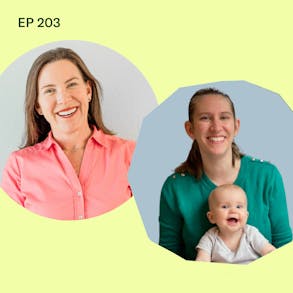
LISTEN TO THIS EPISODE
Episode Description
Is it possible to be Vegan but feed your baby meat?...Of course! In this episode Suzy Quebbeman who is a vegan mom, married to a cattle-rancher and offering her baby animal foods while practicing baby-led weaning is here to talk about her family’s feeding dynamics and how she is open to offering her baby a variety of foods.
About the Guest
- Suzy Quebbeman is a mom with a 7 ½ month old daughter named Mara who is doing baby-led weaning.
- Suzy has been a vegan for about 8 years, her husband is a cattle-rancher and her daughter has been given the freedom to eat a variety of animal products including the allergenic foods.

Links from This Episode
- Baby-Led Weaning with Katie Ferraro program with the 100 First Foods™ Daily Meal Plan, join here: https://babyledweaning.co/program
- Baby-Led Weaning for Beginners free online workshop with 100 First Foods™ list to all attendees, register here: https://babyledweaning.co/baby-led-weaning-for-beginners
Other episodes related to this topic:

Latest Episodes
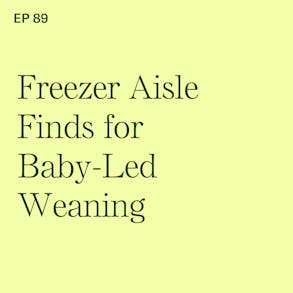
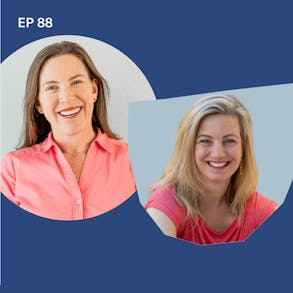
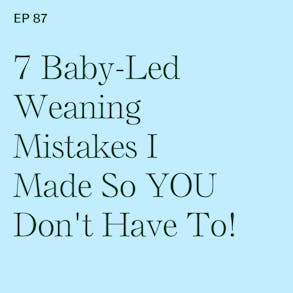
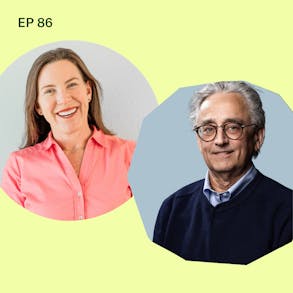
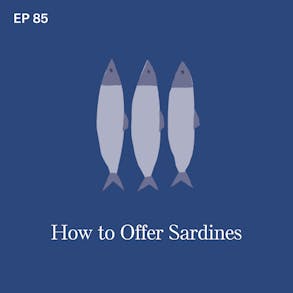
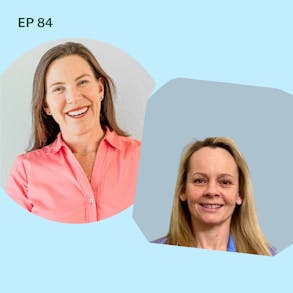
Suzy Quebbeman (1s):
There's no right or wrong way to be vegan. If you want your baby to also be vegan that's okay. But if you're choosing for your child not to be vegan, that's also okay. And that's giving them the choice later on in life.
Katie Ferraro (15s):
Hey, there I'm Katie Ferraro, Registered Dietitian college nutrition professor and mom of seven specializing in baby led weaning here on the baby led weaning made easy podcast. I help you strip out all of the noise and nonsense about feeding, leaving you with the competence and knowledge. You need to give your baby a safe start to solid foods using baby led weaning. Hey guys, welcome back. I've got a little bit of a different type of episode for you. Normally our Monday episodes are mini baby led weaning training episodes. But today I wanted to interview a mom that had been talking to for a little while on Instagram. Our Thursday episodes are generally interviews that are longer with feeding experts, but she's not a feeding expert, but she's an expert as mom.
Katie Ferraro (1m 1s):
The way I see it. And this is a mom and her name is Suezan. Quebbeman Suzy Quebbeman. And she is a vegan. Her husband is a cattle rancher and her baby is doing baby led weaning. And it was watching her posting these videos of her baby's eating meat, her baby eating meat, but she said she was a vegan. I'm like, I'm very interested in this. And I'm just interested in how different families make it work when they're starting foods. And since we're all kind of here to learn together, I just wanted you guys to hear Suzy's story. She's has a seven and a half month old daughter named Mara. And she's going to share about just some of the Family Feeding Dynamics when one of the parents is vegan and the other one is not. So I hope you guys enjoy this interview with Susie quebbeman about being a Vegan Mom, married to a cattle Rancher Dad and having a BLW Baby.
Suzy Quebbeman (1m 48s):
Thank you so much for having me today.
Katie Ferraro (1m 50s):
All right. Before we dive in, could you tell us a little bit about yourself? Where are you from? What do you do? And then I'm going to ask you a bunch of questions about your baby.
Suzy Quebbeman (1m 58s):
So I'm originally from Los Angeles and my husband and I now live in a suburb just outside of Washington, DC. I got my master's in public health from George Washington university. And I currently work in the pharmaceutical industry, helping with data, doing statistics and analysis, as well as just other epidemiological items,
Katie Ferraro (2m 20s):
As someone who has a master's in public health. And didn't, I like epidemiology, but I always found like the statistics classes to be the hardest. And when they started like doing the computer programs, I remember like SAS and stuff. My eyes just like glazed over it as like, this is not for me. I need to stick to food. So, but every research study I've ever worked on, like, you need a statistician. So it's very important that I really admire the work you guys do. It's just like data is it's overwhelming. Sometimes.
Suzy Quebbeman (2m 45s):
Yes. I spent a lot of time in my day-to-day life in SAS.
Katie Ferraro (2m 49s):
All right. So tell us a little bit about your
Suzy Quebbeman (2m 51s):
Daughter. So my daughter is Mara and she is seven and a half months old. She is my first and we absolutely love and adore her. She is just a bundle of joy. Okay.
Katie Ferraro (3m 1s):
You are here. I'm going to give everyone the backstory. So Susie is a vegan and her husband is a cattle rancher and their babies doing baby led weaning. And I first got introduced to you. You guys were on Instagram and you were talking about being the Vegan Mom or sharing a story. And you're like, but your baby was eating lamb. And I was like, I got to get to the bottom of this. So before I ask some specific questions about feeding Mara meat, even though you're vegan, there's lots of reasons why people choose veganism. I am not a vegan. I respect all of the reasons why someone might be. But just curious if you're okay with sharing with us, why did you decide to be a vegan? How long have you been a vegan? Like what's the why behind your veganism?
Suzy Quebbeman (3m 38s):
I've been vegan for about eight years and it came during my undergraduate. I did my undergraduate in exercise or wellness, and I had three classes. One was obesity and weight management. One was chronic diseases. And one was nutrition for chronic diseases. That's all kind
Katie Ferraro (3m 54s):
Of sound like the same class. Sorry.
Suzy Quebbeman (3m 56s):
They basically were. So all three of them required a diet change. So all three of them, one wanted us to eat more plants, another one at us to lose 10 pounds in a semester or gain, or you could make a reason for keeping the same weight because it was obesity and weight management. And then the last one, the nutrition was about doing a diet that could affect a chronic disease.
Katie Ferraro (4m 19s):
I am so sorry. You were in a nutrition class where there was a requirement to have a weight fluctuation, like,
Suzy Quebbeman (4m 25s):
So it was obesity and weight management. It was mostly for personal trainers. And so it was for you to experience a great body change that you would be asking clients.
Katie Ferraro (4m 34s):
And I'm so sorry, but that course was not taught by Registered Dietitian, I would assume. Okay. Because you would, sorry. That is like eating disorder training one-on-one is we do not require people to change their weight. And so having taught at the college level for many years, I take major issue with like non nutrition people, teaching nutrition classes. So just checking there because it's kind of an unusual requirement, right? Like, go change your body weight. Like, what if you have an underlying eating disorder, hopefully there was an exemption or an exception for that.
Suzy Quebbeman (4m 60s):
Yes. So there absolutely was. You could always say that you wanted to keep your weight and you could write out why.
Katie Ferraro (5m 6s):
Okay. So the coursework that you took kind of opened your eyes to the health benefits of a vegan diet, is that inappropriate interpretation
Suzy Quebbeman (5m 14s):
Diet change. We had to do it ourselves and document how it was going. All three of the classes, me and a couple other students we've discovered that since they were all overlapping, that if we went vegan, that would satisfy the requirement for all three different classes.
Katie Ferraro (5m 29s):
Oh. So it was kind of like a shortcut in school that ended up being a lifestyle change for you?
Suzy Quebbeman (5m 32s):
Yes, exactly. After the semester was over, I thought I was going to go home for Christmas break and just to have a big Christmas dinner, have all the, all the Turkey. And I looked at my parents and I said, I feel so much healthier, so much better and not interested in the meat. I'm not interested in the dairy. I'm not interested in the eggs. This is just who I am.
Katie Ferraro (5m 54s):
Okay. Then you meet your husband and he's a cattle rancher. Like that is kind of an unusual match. If I may a vegan and a cattle rancher, like how did that happen? And were you vegan before you met him? And like, was that a barrier at all to your relationship at the beginning?
Suzy Quebbeman (6m 8s):
So the day I met my husband was actually the same day that I ate my last hamburger. You
Katie Ferraro (6m 15s):
Didn't even know it either, right?
Suzy Quebbeman (6m 17s):
No. So we were, we had just met at a church activity and we're standing there talking and I was channeling down on my last burger that I would ever eat. And I had known him for a year before we ended up even dating. Okay.
Katie Ferraro (6m 30s):
But you were vegan that whole year. So we knew what he was getting into.
Suzy Quebbeman (6m 34s):
And he had told his roommate, he swore he would never date a vegan because taking her out to eat would be way too difficult. And he didn't know what his family would think. But then one of my roommates just looked at me and said, you know, you and your husband, my now husband would just be absolutely perfect together. And I went, Hmm,
Katie Ferraro (6m 51s):
I love that. This is, you know, there's someone for everyone I firmly believe, but you don't normally hear about vegans and families of cattle, ranchers dating each other. So I'm glad it worked out. You have baby Mara now she's seven and a half months old. Tell us a little bit about your feeding philosophy, because I think it's really, I just want to pick your brain. Like you are a vegan who decided to feed your baby some non-vegan foods. And most of my audience is not vegan. I just want to clarify that like parents ask me all the time and I'll share other resources, but I include animal foods in all of my programs, because I believe in the benefits of many of those foods, but I completely respect families who don't eat them. But also from an allergenic standpoint, half of the big eight allergenic foods are animal foods.
Katie Ferraro (7m 32s):
And we have some good data to show that early introduction of these foods can help prevent food allergy. So I'm curious if any of that played into your decision to have Mara include animal foods or like what kind of discussions did you and your husband have or did you just like take it and run with?
Suzy Quebbeman (7m 45s):
So, because I have all the background in health, all of the feeding stuff was fully up to me. My husband just said, you know what, I'll handle history one day, but you handle all the health stuff because that's what you specialize in. So actually in that nutrition class, we had a day where we got to just do questions and answers with our professor. And we had a whole bunch of questions about what it would be like for children. What suggestions do you have for children? What can we do for them to prevent chronic disease down the line? And I have it written down. I wrote it in a special little notebook somewhere that let the baby feed themselves. Okay. I don't know what that means right now, cause I am 20 years old, but I will run with it one day.
Suzy Quebbeman (8m 30s):
And so when I was having a baby, I looked at it and I was reading all these other mommy blog things and learned that that meant baby led weaning. And so, as I learned more about baby led weaning, I saw a whole bunch about allergens and I thought, Hmm, if we're doing early and often with allergens, I want to make sure that my daughter can eat whatever she wants. One day. I don't want to pigeonhole her into a vegan diet because that's what I chose for her when she was six months. I want her to be able to be a teenager and go out with friends, to being from California, go out to In N Out and have whatever she wants because I do know how hard that can be as a college student or now even as an adult to go out and difficulties with some sort of a diet restriction.
Suzy Quebbeman (9m 18s):
So then learning about the big eight and learning and seeing, like you said, about how half of them are animal foods. I saw that I really needed to introduce all of those and just don't restrict.
Katie Ferraro (9m 31s):
I love that perspective. And I've heard other vegan parents say that like, maybe this child will choose not to be vegan down the road. And so I want to give them the benefit of knowing how to eat these foods, being familiar with these foods from an allergenic standpoint, reducing the risk of food allergy to these foods. So I heard that and I think it's cool to hear it directly from you because you're kind of living this in real life right now with your daughter Mara. So your husband is not vegan. His family are cattle ranchers. And you shared with me that when you visit them, like they don't know how to make anything vegan. So how did you guys do meals as a vegan with a meat eating husband before the baby and then has anything changed since then?
Suzy Quebbeman (10m 12s):
Our household, usually I was always cooking all the meals. So that meant we ate pretty much all vegan every once in a while, like if I were making pizza, my husband would get normal cheese because it was cheaper than vegan cheese or he gets normal Mayo because it's cheaper than regular Mayo. And on his pizza, he likes pepperoni. So we have some pepperoni. And then when we visit his family, it was his family would make a meal and he would eat it and I would go and make myself a potato because being close to Idaho, there are lots of potatoes around.
Katie Ferraro (10m 46s):
So then with your husband, does he have like a pretty good palette? Does he eat a lot of different foods or is he being exposed to new foods as you guys are exposing your daughter to new foods?
Suzy Quebbeman (10m 55s):
One of the things that I definitely found was the grains. You had so many different whole grains on your list. And so we just had to run out and buy them. And today I just cooked up farro out and my husband looked at it and was like, what's farro. And I was like, it's a great, it's kind of like rice, try it.
Katie Ferraro (11m 11s):
Okay. What are you going to do with it? I'm so interested to know. So
Suzy Quebbeman (11m 14s):
I did a teriyaki tofu bowl with farro was how I ate it for myself. And then for my daughter, I had, I'm attempting fritters. I've never done fritter as much. So I attempted to mix it with egg and it fell apart. And then I attempted to resolidify it.
Katie Ferraro (11m 28s):
Yeah, the here I have a pro tip for the fritters is that the grains have to be dry. Like if they're at all and farro is a hard one because if it like comes right off the pot and it's like a little bit moist or wet, it doesn't do well. So kind of like how they say, you know, day older, two day old cooked rice makes the best fried rice, like throw it in the fridge and let it kind of dry out so that it's totally dry. It as much better in a fritter. Or if you have a salad spinner, I'll just put the cooked grains in the salad, spinner, pump it a couple of times and get all the moisture off of it. And then just like dry them out on a paper towel. And then they do much better in the fritters.
Suzy Quebbeman (11m 60s):
That would be a huge help to make my fritters not fall apart. Has
Katie Ferraro (12m 3s):
We had tofu or soy? Oh yes. People always say, I don't know what to do with tofu. I was like, well, it's pretty easy for babies. You will find one without salt. And then you cut it into strips about the size of your adult pinky finger and give it to your baby. And you just knocked off one of the big eight allergenic foods. So there's a lot of room for vegan foods in a baby led weaning diet as well.
Suzy Quebbeman (12m 22s):
Yes, definitely. Tofu is probably one of the easiest ones for me.
Katie Ferraro (12m 26s):
What other allergenic foods have you done with Mara so far?
Suzy Quebbeman (12m 28s):
So she has had every allergenic food except for shrimp so far.
Katie Ferraro (12m 32s):
How are you going to do shrimp?
Suzy Quebbeman (12m 34s):
Shrimp is going to being even this week or next she hasn't done an allergenic food this week. So I think it's probably going to be this week and I'll just properly saute it up like a shrimp scampi. I think
Katie Ferraro (12m 46s):
does she have a tooth or more than one tooth?
Suzy Quebbeman (12m 48s):
Nope, not yet, but she is killing it with taking bites with her gums.
Katie Ferraro (12m 52s):
Okay. Because a lot of Babies can with their gums sometimes just, you know, watch the texture. Cause if it's particularly rubbery and like you couldn't eat it with your lips over your teeth, then don't give it to your baby. But you can also do cook shrimp, just ground up really fine in a fritter batter recipe. Like almost you'd make a crab cake. You could make crab is a type of shellfish. So you could use crab if you had it to introduce baby to shellfish, but you can also do shrimp and just put it look up any crab cake recipe. I usually use panko bread crumbs instead of regular bread crumbs because there's so much lower in sodium. And then, you know, I see you're a vegan, but you've already done eggs. So she's had egg in it. And you just need that binding agent to kind of help everything stick together.
Suzy Quebbeman (13m 28s):
Yeah, definitely. I've got a couple of Kansas clams, just, I was prepping for a crab cake of some form for her at some clap clams crab. I was prepping for crab cake at some point for her. So.
Katie Ferraro (13m 39s):
Perfect. That's awesome. What do other people say when they see your baby eat?
Suzy Quebbeman (13m 44s):
So I've been hesitant to show a lot of people, but I have a couple of friends who have seen pictures of her eating and they say, wow, she just eats everything. You're doing it. So right. She's not going to be a picky eater. We were at a Christmas party and I was giving her some pre prepped, mashed potatoes that I had made on the side without all the salt for her. And so I handed her a spoonful of mashed potatoes and she was going to town with her little spoon and everyone at the party just looked at me and they asked like, how old is she? I'm like, oh yeah, six and a half months. They're like, she knows how to use a spoon??. Our toddler doesn't know how to use a spoon.
Suzy Quebbeman (14m 24s):
So many people were so impressed.
Katie Ferraro (14m 25s):
So Susie, do you have any advice for families where either one or both of the parents might be vegan, but they're considering doing either a, like all vegan for their baby or be maybe more of what you guys are doing incorporating some animal foods. Like you're living it right now in the thick. What would you say to these parents? One or more vegan parents in the family?
Suzy Quebbeman (14m 41s):
If there's just one vegan parent, I feel like you're probably already used to cooking two meals or at least cooking something on the side. So it's no different for me right now than what we are normally living. But if both are vegans, so if I wasn't cooking on the side, then that's exactly it. Just pre prep, a little something off to the side. So when I'm cooking Mara like her fish, we had, she did salmon for her fish. And so I just pre prepped a little fish filet for her and it got half frozen and half stayed in the fridge and she kept trying it all week long. And then I did the same thing for her lamb. She's got lamb in the freezer for every other time that I need to pull out some sort of a protein for her.
Katie Ferraro (15m 26s):
Is that the lamb that you said you had to wear gloves to prepare?
Suzy Quebbeman (15m 30s):
Yes. I don't touch meat, I prepped it with gloves on and I make sure that she's out of the room just in case I start gagging while they smell it.
Katie Ferraro (15m 39s):
It's so tough because every always texted me after like, oh, thanks. Now my babies smells like lamb was like, I know, but think about what an incredibly flavorful protein food that is your baby just got to try pack full of iron and new textures and tastes, et cetera.
Suzy Quebbeman (15m 51s):
Yeah. The day she had to try sardines, my mom was laughing at me. She's like, oh man, most adults won't eat a sardine. If you're feeding your baby a Sardine..
Katie Ferraro (16m 1s):
I love them. Do babies with sardines are the best. I have a whole episode on how to make sardines safe for your baby to eat. And then we also, I just wanted to mention, because people always say, if you don't do enough vegan content, it's like, I'm not vegan. I can't speak an educated manner about something I don't live, but I have interviewed, I had Alex and Whitney. I'm not sure if you're familiar with them, but they're two registered dieticians who run the Instagram account. Plant-based juniors. They also have a book that's about the plant-based baby and toddler and they're not fully vegan, but a lot of people in their community are so they have great information and they were on the podcast in episode 127, talking about how do vegan families introduce potentially allergenic foods. So go check that out. If you want more vegan tips. And then my only vegan tip that I have for you is that if you ever do go to like a no egg lifestyle, is that what a lot of vegan families will do for fritters?
Katie Ferraro (16m 48s):
Because so many of those cooked grains that you were talking about, that's in my a hundred FIRST FOODS list, they do better as a fritter, but in a basic fritter recipe, there's egg, which kind of when the protein coagulates in sets, it holds everything together. Well, if you take the egg out, cause you're vegan, how do you hold everything together? You can do a chia seed or flax seed water substitute. So basically you take one tablespoon of flax seed or chia seed mixed with three tablespoons of water, mix it with a fork, let it set for a couple of minutes. Not till it gets like super solid, but kind of about the consistency of an egg white and then that's equal than of one egg. So mix that into your fritter batter. And I've tried it with all of the 20 grains in the a hundred FIRST FOODS list. And it works great as a substitute. If you don't have an egg or you don't want to use eggs for me, I usually run out of them.
Katie Ferraro (17m 30s):
Or if you don't eat eggs because your family is vegan,
Suzy Quebbeman (17m 33s):
The flax seed for pancakes. And I absolutely love it because it's adds the additional iron. So I get to think about that as a higher iron food for her.
Katie Ferraro (17m 42s):
Look at you, knocking them out left and right. I love it. And I love that you're cognizant of iron, but not freaking out about it. Some vegan families with my baby won't get enough iron. If you don't eat animal foods, the human body becomes more adept at absorbing the iron from the plant foods. Like sure, it's not as good at absorbing it as we are from animal foods, but your body adapts. And it's perfectly possible to have a well-balanced vegan diet. You can also have like a junk food vegan diet, right? Like I know a lot of families that will eat vegan Mac and cheese all day long. And is that nutritionally balanced? Not necessarily. So I think it's so nice to talk to someone who's learning about feeding your baby, incorporating some of your beliefs and practices and also kind of giving her the freedom to try these foods that she might be interested in eating down the road.
Katie Ferraro (18m 22s):
Yes, definitely. Well, Suzy, thank you so much for sharing your story with us. I was just so nice to meet you. I know we were messaging back and forth a lot on Instagram and I'm sorry, I'm a bit of a stalker, but I was like, I need to talk to her because I want you to share your story that there's no right or wrong way to do this. And I was curious if you had any final thoughts for our listeners as someone who's kind of figuring it out as you go.
Suzy Quebbeman (18m 42s):
Just the biggest thing is if you are vegan already, there's no right or wrong way to be vegan. So often we get told that as vegans, we're so pushy and we're shoving our belief on to other people. And if you want your baby to also be vegan, that's okay. But if you're choosing for your child not to be vegan, that's also okay. And that's giving them the choice later on in life.
Katie Ferraro (19m 6s):
You know, I never thought about that. There's a lot of similarities. A lot of people think, oh, in Baby led weaning that you're voicing your opinions on everyone else. And baby led weaning has a bad rap as being a really judgmental space in parenting. And I've worked very hard to make this the largest digital community dedicated solely to baby led weaning and a total judgment free zone. So I think we're both kind of doing our part for our respective areas of interest. And thank you again, Susie, for being here, it was such a pleasure hearing from you.
Suzy Quebbeman (19m 34s):
Thank you so much. It's so great to talk about veganism with my baby too,
Katie Ferraro (19m 39s):
Well, I hope you guys enjoyed that interview with Susie Quebbeman I don't know about you. I just love hearing people's like personal stories, how they got to where they are. I think it's so cool that she's kind of figuring it out as she goes, right? That's life that's parenting. We're kind of building this thing as we're already flying. So thanks for tuning in and listening to Suzy story, I'm going to link to some of the different resources that were mentioned in this episode, in the show notes, which you can find at blwpodcast.com forward/203. And if you want to grab my a hundred FIRST FOODS list, we were mentioning the 20 different whole grains that are on the a hundred FIRST FOODS list. I give that away to everyone on my free weekly workshop called baby LED WEANING FOR BEGINNERS. It's all about how to get your baby to eat 100 foods before turning one.
Katie Ferraro (20m 20s):
Without you having to spoonfeed purees or buy pouches, you can sign up for this week's workshop times and grab your copy of the a hundred FIRST FOODS list with those 20 plant-based whole grains and there in lots of other foods on there as well, 80 to be precise if you had to babyled weaning.co again, baby led weaning.co to sign up for the workshop. Maybe I'll see you there. Thanks for listening. Bye now.

The Program Baby-Led Weaning with Katie Ferraro
A step-by-step digital program for starting solid foods safely and navigating the original 100 FIRST FOODS™ meal plan with baby-led weaning.
 EXPERT-LED, PROVEN APPROACH TO EATING REAL FOOD
EXPERT-LED, PROVEN APPROACH TO EATING REAL FOOD CONCISE VIDEO TRAININGS TO MASTER BABY-LED WEANING
CONCISE VIDEO TRAININGS TO MASTER BABY-LED WEANING 100 FIRST FOODS DAILY MEAL PLAN WITH FOOD PREP VIDEOS
100 FIRST FOODS DAILY MEAL PLAN WITH FOOD PREP VIDEOS
Baby-Led Weaning for Beginners Free Workshop
Is your baby ready to start solid foods, but you’re not sure where to start? Get ready to give your baby a solid foundation to a lifetime of loving real food…even if you’re feeling overwhelmed or confused about this next stage of infant feeding.
Get baby-led weaning recipes and tips delivered to your email inbox.

